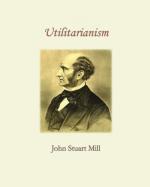But if this doctrine be true, the principle of utility is proved. Whether it is so or not, must now be left to the consideration of the thoughtful reader.
CHAPTER V.
ON THE CONNEXION BETWEEN JUSTICE AND UTILITY.
In all ages of speculation, one of the strongest obstacles to the reception of the doctrine that Utility or Happiness is the criterion of right and wrong, has been drawn from the idea of Justice, The powerful sentiment, and apparently clear perception, which that word recalls with a rapidity and certainty resembling an instinct, have seemed to the majority of thinkers to point to an inherent quality in things; to show that the Just must have an existence in Nature as something absolute-generically distinct from every variety of the Expedient, and, in idea, opposed to it, though (as is commonly acknowledged) never, in the long run, disjoined from it in fact.
In the case of this, as of our other moral sentiments, there is no necessary connexion between the question of its origin, and that of its binding force. That a feeling is bestowed on us by Nature, does not necessarily legitimate all its promptings. The feeling of justice might be a peculiar instinct, and might yet require, like our other instincts, to be controlled and enlightened by a higher reason. If we have intellectual instincts, leading us to judge in a particular way, as well as animal instincts that prompt us to act in a particular way, there is no necessity that the former should be more infallible in their sphere than the latter in theirs: it may as well happen that wrong judgments are occasionally suggested by those, as wrong actions by these. But though it is one thing to believe that we have natural feelings of justice, and another to acknowledge them as an ultimate criterion of conduct, these two opinions are very closely connected in point of fact. Mankind are always predisposed to believe that any subjective feeling, not otherwise accounted for, is a revelation of some objective reality. Our present object is to determine whether the reality, to which the feeling of justice corresponds, is one which needs any such special revelation; whether the justice or injustice of an action is a thing intrinsically peculiar, and distinct from all its other qualities, or only




